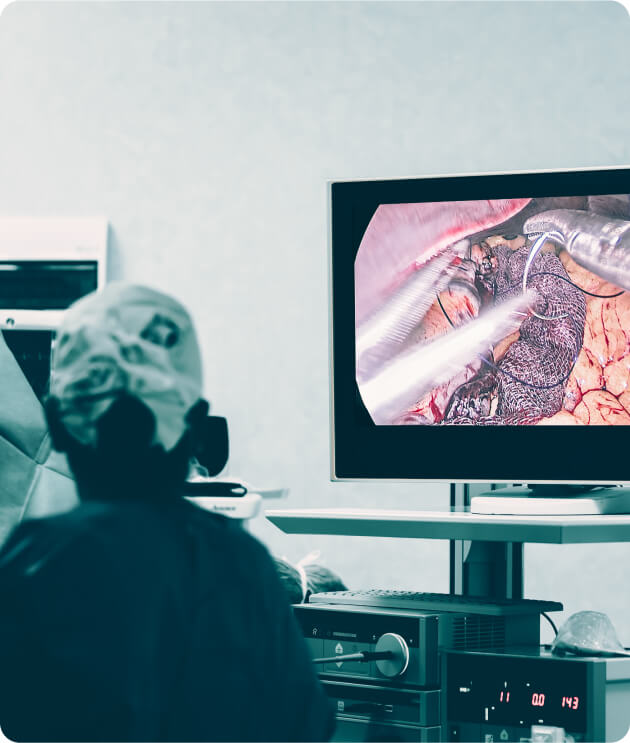Sleeve Gastrectomy
Every year, hundreds of thousands of us decide to change our lives with weight loss surgery. Most often, that surgery is a sleeve gastrectomy. Doctors recommend this option more frequently because it is extremely effective while being significantly less invasive than the older gold-standard procedure, the gastric bypass. While all types of bariatric surgeries are safe and have their share of benefits, the moderate nature of sleeve gastrectomy translates into a lower risk of complications and an even more improved quality of life for patients.

What is a Sleeve Gastrectomy?
Sleeve gastrectomies remove roughly 75 to 85 percent of the stomach, with the remainder being sewn into a sleeve-like shape. Unlike the more complex and invasive gastric bypass, however, the rest of the digestive system is left intact and food is digested normally. Doctors have found that the positive outcomes of this procedure are comparable with bypasses while also providing faster recovery times and greater safety than an already very safe procedure.
If you are ready to end your struggles with obesity, a sleeve gastrectomy can make that goal far more achievable. But first, you should understand why these procedures are increasingly being seen as medically necessary.

Weight Loss Surgery is Not Cosmetic
Almost nobody chooses to be obese and, once you become obese, the sheer physical and psychological difficulty of losing weight has been documented and has nothing to do with a lack of character. And that makes the many health downsides of obesity a deeply unfair fact of life.
We probably don’t need to tell you that type 2 diabetes and high blood pressure are both extremely common in people struggling with obesity. With these and other conditions comes a much greater risk of heart disease, heart attacks, strokes, and kidney failure. People with weight issues also run a higher risk of certain types of cancer and may be more vulnerable to many ailments, including complications of COVID-19 and other communicable illnesses.
These risks can feel abstract. “Everyone dies of something” is one common fatalistic response. What people don’t understand is that, especially with today’s increasingly effective healthcare, it’s likely that we will survive our first, second, third, or even fourth heart attack or stroke. With each incident, however, recovery will only become longer and more painful. Our life may be shortened by obesity but, even worse, the quality of our limited time on this planet may suffer just as much.
Health emergencies and illnesses are just one source of pain. Placing excessive weight on muscles and joints can worsen chronic distress related to arthritis, sciatica, nerve issues, back problems, and numerous other conditions. Pain can make it difficult to exercise, leading to a vicious cycle: the more weight we gain, the harder it is to exercise, the easier it becomes to gain even more weight, and the more pain we suffer.
Considering all of this, it’s not surprising that severely obese people also face another serious and potentially life-threatening illness: depression. Even if someone is not clinically depressed, dealing with the grind of being overweight and unsuccessfully trying to lose weight is not good for anybody’s mood.
Body Positivity – Do I Really Need to Stop Being Obese?
That’s your choice. People who embrace body positivity are absolutely right in many ways. Standards of beauty are highly subjective and constantly changing. And while obesity can definitely hurt our self-esteem, it doesn’t have to. Moreover, a healthy diet and regular exercise even without weight loss can substantially reduce – though not eliminate – many of the most serious health risks of obesity.
Moreover, the more we learn about obesity, the more we are certain of the nearly intractable nature of weight issues in most cases. The problem has nothing to do with anyone’s moral failings. Obesity is comparable to an extremely hard-to-beat physical addiction but, unlike alcohol and cigarettes, we had no choice in starting the habit and we don’t have the option of simply giving it up.
If you are severely obese but also believe you are healthy and happy or don’t want the procedure for any other reason, then weight loss surgery isn’t for you. Especially if you are not beset with serious health problems, it’s a valid choice to accept your weight as a fact of life and focus on becoming as healthy as you can otherwise. But, if severe obesity is not acceptable to you, then it may be time for a serious change.
Defeating Outmoded Survival Skills
Once you’ve tried and failed to permanently lose weight a few times you’ll likely understand why we think that, for the vast majority of severely obese people, bariatric surgery may be the only practical path to significant long-term weight loss. That might seem like an extreme statement but, the more we learn, the more it becomes clear that human beings aren’t really set up to permanently avoid overeating without the support of weight loss surgeries.
For thousands of years, most people spent every day simply seeking enough food to survive and thrive. The only sugar we ingested came from plants, including fruit that was often a great deal less sweet than what we’re used to today. Famine and starvation were always a possibility. So, our bodies developed ways to efficiently store life-giving calories when times were at their hardest. But what happens when excess fat becomes a threat to our survival and large amounts of calories are as close as our refrigerator or the nearest drive-through?
Indeed, the more extreme the effort we make and the more weight is lost, the harder maintaining a weight loss can become. A widely-publicized 2016 study of former contestants from The Greatest Loser TV reality show made it clear that very low-calorie diets coupled with an extreme exercise regimen could backfire in the long run, slowing down the metabolism and causing us to experience constant urges to eat.*
As the authors of the study pointed out, bariatric surgery remains the only medical intervention we have that allows people to defeat obesity permanently. Make no mistake, weight loss is always a serious challenge and bariatric procedures are by no means effortless. The difference is that, with weight loss surgery, your efforts have a good chance of paying off.
* “6 Years after The Biggest Loser, Metabolism Is Slower and Weight Is Back Up,” Scientific American. Kathryn Doyle. May 11, 2016
How Does Sleeve Gastrectomy Work?
While bariatric surgery has been employed with great success for decades, it’s taken some time for researchers to figure out why exactly why surgeries worked so well. Many people still assume that weight loss procedures motivate people to eat less simply by making overeating very unpleasant. It turns out that is only a part of the story. These procedures appear to greatly lower the production of hunger-inducing hormones that cause obese people to want to overeat in the first place.
We now understand that hunger-inducing hormones are largely manufactured in certain regions of the stomach. Removing about three-fourths of the stomach appears to reduce the production of these hormones sufficiently to allow patients to form a new relationship with the food they eat.
Both the older gastric bypass and the sleeve gastrectomy substantially reduce the production of hunger hormones. The difference is that the sleeve procedure simply removes about three-quarters of the stomach, otherwise leaving the digestive tract alone. The more radical gastric bypass literally bypasses the stomach and the large intestine by creating a tiny pouch as a stomach replacement and a Y-shaped connection to route food directly to the small intestine. Although some doctors may consider the bypass more certain in terms of its outcome, increasing evidence shows that a less extreme sleeve procedure may be just as effective as the bypass for most patients.


Is Sleeve Gastrectomy Always the Best Bariatric Surgery Option?
Not quite. Sleeve gastrectomy may be the best option in most cases but there are exceptions.
While there is no denying that a gastric bypass is a more extreme procedure with a higher risk of complication, bypassing the large intestine means that it also reduces the number of calories obtained from food. Since the same applies to important nutrients, more supplements are required to ensure the patient’s ongoing good health but it does add another layer of support to weight loss effort. When doctors recommend gastric bypasses it is usually under one of two circumstances:
ü When severely obese patients are more extremely overweight;
ü When a sleeve surgery fails to provide the desired outcome. In this relatively rare circumstance, the solution may be to convert a sleeve gastrectomy into a gastric bypass.
- When severely obese patients are more extremely overweight;
- When a sleeve surgery fails to provide the desired outcome. In this relatively rare circumstance, the solution may be to convert a sleeve gastrectomy into a gastric bypass.
Successful Conclusions for Patients’ Weight Loss Journeys
While weight loss surgery is a legitimate modern miracle and very safe, it is important to choose your medical provider wisely. The experienced and knowledgeable BHP team is proud of our outstanding reputation based on consistently good outcomes for our patients.
To get a good idea of what our procedures can do, please visit our gallery of
patient success stories and before and after images.

Does Insurance Pay for Sleeve Gastrectomy Costs?
Because it has proven to have so many health benefits, weight loss surgery cost is usually mostly covered for severely obese patients, i.e., people with BMIs of 40 or over or with BMIs of 35 and over who are suffering from significant related health issues. Our outstanding consultants are here to help you negotiate the often complicated path to ensuring your procedure is covered before your procedure.
Support Before and After Surgery
After you have had your procedure, your bariatric surgeon and our skilled and compassionate medical team will keep track of your recovery and weight loss journey. A registered dietician will also be available to provide detailed advice to smooth over the transition to your new way of eating. In addition, since no organ of the body is more important for healthy weight loss than the brain, Beverly Hills Physicians also provides access to a psychologist specializing in the field of healthy eating and weight loss.
Finally, dramatic weight losses invariably make people feel better than they have in years. However, they can sometimes cause unattractive and occasionally uncomfortable skin folds. One major benefit of working with Beverly Hills Physicians is our outstanding in-house network of first-rate plastic surgeons. These leading surgeons have performed numerous tummy tucks and other post-bariatric procedures.

Get on the Path to a Better Life Today
There’s no time like the present to get started. Beverly Hills Physicians offers free first-time consultations for prospective weight loss patients. For further information call 800-670-3602 or request a free consultation online.
